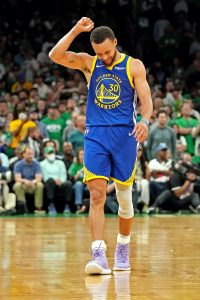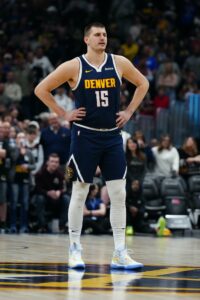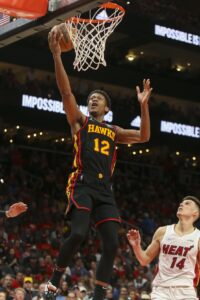When the NBA and the Players’ Association introduced the Designated Veteran contract in the 2017 Collective Bargaining Agreement, the goal was to help teams keep their very best players by giving those clubs the unique ability to offer more lucrative contracts to stars who met certain performance-related criteria.
 The Designated Veteran rule allows a player with between seven and nine years of NBA experience – who would normally qualify for a starting salary worth 30% of the NBA’s salary cap on a new free agent contract or extension – to become eligible for a salary worth up to 35% of the cap if he meets one of the following requirements:
The Designated Veteran rule allows a player with between seven and nine years of NBA experience – who would normally qualify for a starting salary worth 30% of the NBA’s salary cap on a new free agent contract or extension – to become eligible for a salary worth up to 35% of the cap if he meets one of the following requirements:
- He was named to an All-NBA team in the most recent season, or in two of the last three seasons.
- He was named NBA MVP in any of the three most recent seasons.
- He was named NBA Defensive Player of the Year in the most recent season, or in two of the last three seasons.
The new rule has been somewhat hit and miss. In some cases, it has worked exactly as intended — Warriors guard Stephen Curry, for instance, signed the very first Designated Veteran free agent contract and earned every penny of it, making four All-NBA teams, winning two championships, and earning his first NBA Finals MVP award over the life of the five-year deal.
The ability to offer a Designated Veteran extension also allowed non-marquee franchises like the Bucks and Nuggets to retain their superstars (Giannis Antetokounmpo and Nikola Jokic) with minimal drama.
In other cases, the Designated Veteran rule has been less effective. Players like Paul George (Pacers), Kawhi Leonard (Spurs), and Anthony Davis (Pelicans), among others, were willing to pass on super-max opportunities with smaller-market clubs in order to push for trades elsewhere.
Additionally, two of the first Designated Veteran extensions signed by star players turned sour well before they expired — John Wall was kept away from the team during the fourth year of his super-max deal, then was bought out of the fifth year by the Rockets, while Lakers guard Russell Westbrook has become impossible to trade without sweeteners as he enters the final year of his own DVE.
Although the Designated Veteran contracts signed to date have been something of a mixed bag, there has been no indication that the NBA or NBPA will be looking to remove the rule in the next Collective Bargaining Agreement. It seems safe to assume it’s here to stay.
Here’s the full list – as of September 2022 – of the players who have signed Designated Veteran contracts since they were introduced in 2017:
2017
 Stephen Curry (Warriors)
Stephen Curry (Warriors)
- Free agent contract. Five years, $201,158,790. Began in 2017/18.
- Qualified by winning Most Valuable Player award in 2015.
- Russell Westbrook (Thunder)
- Contract extension. Five years, $206,794,070. Began in 2018/19.
- Qualified by making All-NBA teams in 2015 and 2016.
- James Harden (Rockets)
- Contract extension. Four years, $171,131,520. Began in 2019/20.
- Qualified by making All-NBA team in 2017.
- John Wall (Wizards)
- Contract extension. Four years, $171,131,520. Began in 2019/20.
- Qualified by making All-NBA team in 2017.
2018
- None
2019
- Damian Lillard (Trail Blazers)
- Contract extension. Four years, $176,265,152. Began in 2021/22.
- Qualified by making All-NBA team in 2019.
2020
- Giannis Antetokounmpo (Bucks)
- Contract extension. Five years, $228,200,420. Began in 2021/22.
- Qualified by winning Most Valuable Player award in 2019.
- Rudy Gobert (Jazz)
- Contract extension. Five years, $205,000,000. Began in 2021/22.
- Note: Gobert’s starting salary was about 31.4% of the 2021/22 cap, rather than 35%. That makes it a Designated Veteran contract, but not a full super-max deal.
- Qualified by winning Defensive Player of the Year award in 2018 and 2019.
- Contract extension. Five years, $205,000,000. Began in 2021/22.
2021
- Joel Embiid (Sixers)
- Contract extension. Four years, $213,280,928. Began in 2023/24.
- Qualified by making All-NBA team in 2021.
2022
 Nikola Jokic (Nuggets)
Nikola Jokic (Nuggets)
- Contract extension. Five years, $276,122,630. Began in 2023/24.
- Qualified by winning Most Valuable Player award in 2021.
- Devin Booker (Suns)
- Contract extension. Four years, $220,441,984. Began in 2024/25.
- Qualified by making All-NBA team in 2022.
- Karl-Anthony Towns (Timberwolves)
- Contract extension. Four years, $220,441,984. Began in 2024/25.
- Qualified by making All-NBA team in 2022.
2023
- Jaylen Brown (Celtics)
- Contract extension. Five years, $285,393,640. Began in 2024/25.
- Qualified by making All-NBA team in 2023.
2024
- Jayson Tatum (Celtics)
- Contract extension. Five years, $313,933,410 (projected). Begins in 2025/26.
- Qualified by making All-NBA teams in 2022 and 2023.
 Hunter clearly worked hard on his game entering year two, as he got off to a great start, averaging 17.9 PPG and 5.6 RPG on a stellar .517/.375/.877 (.646 true) shooting line in 17 games (33.3 MPG). Unfortunately, things went downhill from there, as right knee discomfort and swelling ultimately led to arthroscopic surgery and multiple setbacks, causing Hunter to miss all but five games the rest of the regular season.
Hunter clearly worked hard on his game entering year two, as he got off to a great start, averaging 17.9 PPG and 5.6 RPG on a stellar .517/.375/.877 (.646 true) shooting line in 17 games (33.3 MPG). Unfortunately, things went downhill from there, as right knee discomfort and swelling ultimately led to arthroscopic surgery and multiple setbacks, causing Hunter to miss all but five games the rest of the regular season.